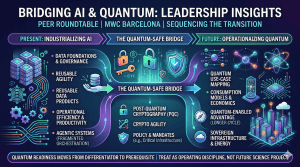As organizations increasingly look to embed AI directly into their products, the need for scalable, developer-friendly, and production-ready embedded Linux environments has never been greater. Traditional approaches to embedded development, whether through complex build systems like Yocto or consumer-grade desktop distros like Ubuntu, force a compromise between developer velocity and production durability.
At Open Source Summit North America 2025, I met with Justin Schneck, Chief Product Officer at Peridio, to explore how the company’s new Avocado OS aims to bridge this gap. Built specifically for the Edge AI era, Avocado OS modernizes embedded Linux with a binary-first design that seamlessly blends cloud-native thinking with the reliability of embedded systems. It’s a platform engineered to meet the needs of developers, data scientists, and device manufacturers all without requiring a degree in low-level Linux engineering.
Legacy Tooling Collides with the Edge AI Reality
An outdated trade-off has long constrained embedded development: either invest heavily in low-level expertise and complex build systems, or sacrifice long-term scalability by prototyping on desktop distributions ill-suited for production deployment. This approach is untenable in the age of Edge AI, where fast iteration, secure deployment, and reproducibility are table stakes.
In our research, we see this challenge intensifying as AI workloads grow increasingly distributed. Whether it’s industrial automation, retail kiosks, or autonomous vehicles, organizations struggle to operationalize AI models across diverse hardware, especially when devices are difficult to access, update, and often managed by cross-functional teams.
As Schneck put it, “The more you harden a system, the more difficult it is for developers to iterate.” With data scientists entering the embedded workflow and demanding faster model deployment and debugging cycles, existing systems are struggling to keep up under the weight of their rigidity.
Avocado OS Brings Cloud-Native Thinking to Embedded Systems
Avocado OS offers a new approach. Designed to support production-ready, AI-native runtimes on embedded devices, it combines the immutability and reproducibility of Yocto with the developer-friendly experience of binary package management. However, this is only at build time, not at runtime.
This architecture creates a decoupled, layered design that allows developers to iterate rapidly without compromising system integrity. Leveraging SystemD extensions and OS tree overlays, Avocado OS eliminates the need for brittle partitioning or monolithic root filesystems. As Schneck explained, “All of the disk becomes your playground… You still get all the guarantees we need for determinism and runtime support, without the hard problem of repartitioning in the field.”
The team is already working with NVIDIA’s Jetson Orin series, NXP’s i.MX 93, and of course, the ubiquitous Raspberry Pi, a critical move to reach a wide developer base. Their joint demo with NVIDIA, built around Triton Inference Server, showcases how data scientists can now deploy and iterate models with hardware-in-the-loop debugging, bypassing traditional system integrator bottlenecks.
This shift is already attracting the attention of top silicon manufacturers. While partner names remain under wraps, Schneck confirmed that “every one of them is experiencing this pain,” and many are exploring vertical integration to sell not just silicon, but AI-ready software platforms.
Embedded AI Needs Abstraction, Not Reinvention
The arrival of Edge AI has exposed the limitations of legacy embedded tooling. Based on our research and Peridio’s trajectory, here are three recommendations for organizations building next-gen edge products:
- Adopt Platforms That Support Both Velocity and Stability
Teams need tools that allow fast, local iteration without compromising on production reliability. Avocado OS’s design balances these needs with a binary-first, immutable runtime model that fits the realities of field-deployed devices. - Design for Multi-Persona Workflows
Today’s embedded teams span data scientists, application developers, and system integrators. Platforms must account for this by reducing complexity and enabling seamless collaboration between personas, especially when AI model iteration drives the product roadmap. - Learn from the Cloud, Adapt for the Edge
Cloud-native best practices, such as layered file systems, declarative updates, and runtime hygiene, are mature and proven. Avocado OS smartly adapts these patterns for the embedded domain, rather than reinventing them, allowing teams to skip costly reinvention and benefit from existing Linux ecosystem investments.
Conclusion
Avocado OS represents an evolution in embedded development: one that removes the historical friction between prototyping and production, developer agility and system integrity. By applying cloud-native abstractions to embedded Linux and grounding them in the specific needs of Edge AI, Peridio has built a platform that resonates across industries and personas.
As AI moves deeper into physical products and edge devices, the tools we use must evolve accordingly. The promise of Edge AI will only be realized when developers, data scientists, and OEMs alike can build with confidence, deploy with speed, and scale without compromise.
Avocado OS might just be the avocado toast of embedded Linux: approachable, modern, and ready to fuel the next wave of innovation.



